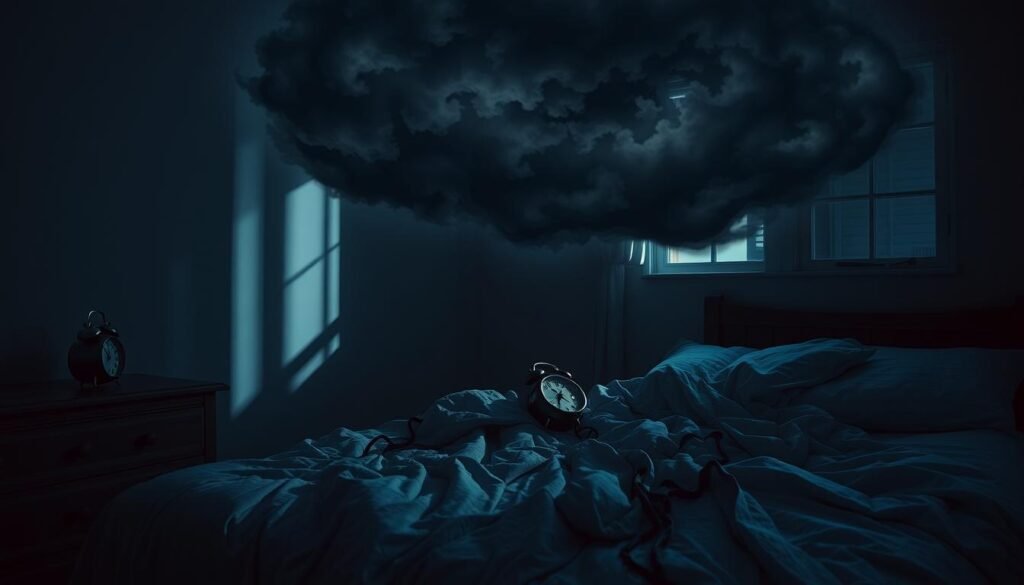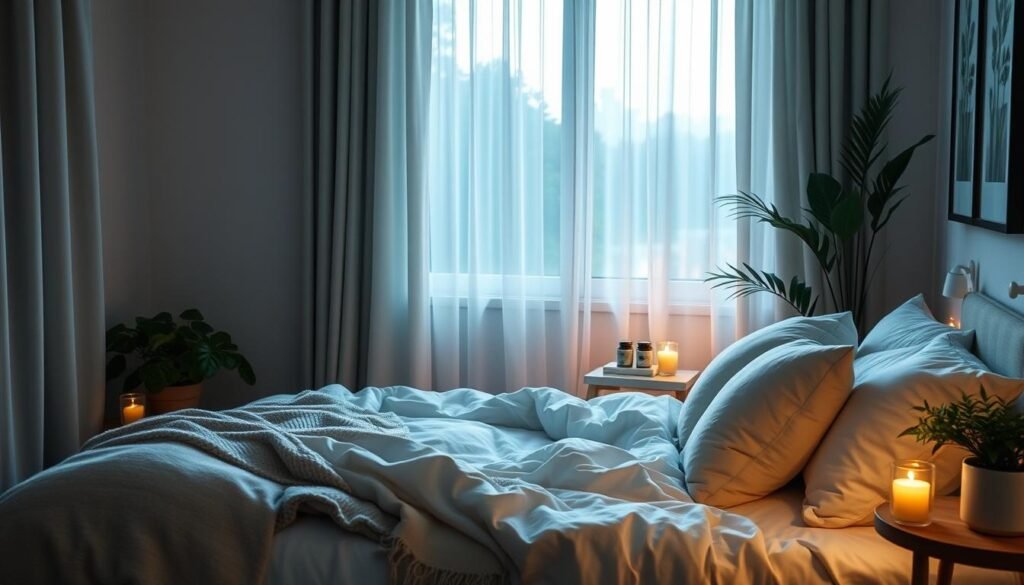Did you know that more than one-third of adults in the U.S. don’t get enough sleep? They miss the recommended seven or more hours of sleep per night. This shows a big problem: insomnia. Many people can’t sleep well, which makes them tired and cranky when they wake up early. Luckily, finding out why you can’t sleep is the key to fixing it.
This article will give you tips for a better night’s sleep. You’ll learn how to stop the cycle of insomnia and wake up feeling good. By looking at what causes poor sleep, you can start using tips and tricks for better sleep. If you want to know more about insomnia and how to treat it, NHS Inform has a lot of useful info.
Key Takeaways
- More than one-third of adults don’t achieve the recommended sleep.
- Insomnia leads to early awakenings, causing daily irritability.
- Effective strategies include lifestyle changes and relaxation techniques.
- Seeking medical advice is crucial if insomnia persists.
- Understanding root causes helps individuals address sleep disturbances.
Understanding Insomnia and Its Impact on Daily Life
Insomnia is a common sleep issue that affects about 30% of adults. It can make falling asleep hard, keep you from staying asleep, or cause you to wake up too early. Because of insomnia, people often feel tired, in a bad mood, and generally unwell.
Studies show that up to 10% of people feel really impacted by insomnia during the day. But, if we look at stricter definitions, like those in the DSM-IV, that number goes down to 6%. Women and older people find it harder, with factors like age, gender, and health issues playing big roles.
- About 75% to 90% of insomnia patients also experience additional medical disorders.
- Depression, commonly associated with insomnia, affects 40% of insomnia patients.
- Severe insomnia can impair functioning more than conditions like congestive heart failure.
- Individuals suffering from insomnia are significantly more likely to experience workplace accidents.
Long term, insomnia can make depression more likely. Getting better sleep can also improve the effects of antidepressants. About 10% to 15% of people have chronic insomnia, making it a major issue. It’s important to understand insomnia well, so people want to get help. This can greatly improve someone’s life.
Common Causes of Insomnia and Sleep Disturbances
To understand common insomnia causes, we need to examine different factors. These include psychological issues, lifestyle habits, and medical conditions. Stress, for instance, can greatly disrupt sleep, making it hard to get good rest.
Bad sleep hygiene also leads to insomnia. Habits like inconsistent sleep times and poor bedtime routines contribute. Also, too much screen time and caffeine before bed are harmful. Making sleep schedules regular and bedtime routines consistent can help.
Below is a table summarizing the primary common insomnia causes and their potential impacts:
| Cause | Impact on Sleep |
|---|---|
| Psychological Factors (Stress, Anxiety) | Increased difficulty falling asleep and maintaining sleep |
| Poor Sleep Hygiene | Irregular sleep patterns leading to insufficient rest |
| Medical Conditions | Sleep disorders linked to heart disease, diabetes, etc. |
| Genetic Predisposition | Higher likelihood of disorders like insomnia within families |
| Obesity | Increased risk of obstructive sleep apnea |
| Shift Work & Jet Lag | Disruption of natural sleep-wake cycles |
It’s important to recognize and tackle these common insomnia causes. Doing so can greatly improve our sleep quality and reduce tiredness during the day. Learning about these factors helps us find ways to sleep better and feel better overall.

Age-Related Sleep Changes and Their Effects
As people get older, they go through age-related sleep changes that can impact their sleep. They may need less sleep, around 6.5 to 7 hours per night. This leads to more light sleep and less deep, restful sleep.
Many older adults find themselves waking up often at night, with three to four interruptions on average. These wake-ups can be due to hormonal changes, stress, and health issues.
Insomnia can be a big issue for the elderly, increasing the risk of accidents and depression. It’s important to spot sleep disorders, like sleep apnea, early. Sleep apnea can affect sleep quality badly and lead to health problems if not treated. Insomnia is very common among those over 60, affecting their health and happiness.
To improve sleep, staying away from caffeine and keeping a regular bedtime can help. Avoiding smoking and too much alcohol before bed is also key. Some older adults may also get help from antidepressants, especially if depression affects their sleep.
| Aspect | Details |
|---|---|
| Total Sleep Time | 6.5 to 7 hours per night |
| Nighttime Awakenings | Averages 3 to 4 times per night |
| Common Sleep Disorders | Insomnia and sleep apnea |
| Age Group with Highest Insomnia Rates | Adults age 60 and older |
| Recommendations for Better Sleep | Avoid stimulants, maintain sleep schedule, limit screen time |
Knowing about age-related sleep changes is key for better sleep in older adults. Healthy sleep habits lead to more restful nights and happier days.
Anxiety as a Trigger for Sleep Disorder
Anxiety is a big trigger for insomnia. About 20% of American adults face anxiety disorders, leading to sleep issues. It’s key to find out what causes anxiety, like stress at work, problems in relationships, or other personal difficulties. Knowing these triggers helps people find ways to cope. This can lessen the symptoms of insomnia.
Identifying Situational Anxiety Factors
Situational anxiety can really mess with sleep. Some common triggers are:
- Work-related pressures and deadlines
- Family conflicts and responsibilities
- Financial concerns
- Health issues or chronic illnesses
- Major life changes, such as moving or job transitions
Knowing these triggers can aid in handling anxiety. This helps stop the cycle of anxiety leading to insomnia. By dealing with these issues effectively, people can feel better. This also lowers the chance of sleep problems.
The Cycle of Anxiety and Insomnia
The link between anxiety and insomnia is like a cycle that feeds itself. Anxiety makes it hard to sleep. Then, not getting enough sleep makes anxiety worse. For example, people with insomnia often experience anxiety disorders too. This cycle makes daily life harder. Yet, using relaxation methods and cognitive behavioral therapy can break this cycle. These steps can lead to better sleep habits.

Managing Difficulty Falling Asleep
To manage insomnia, create a sleep-friendly environment and stick to a regular bedtime. Good sleep hygiene can greatly improve sleep. This helps you fall asleep faster and stay asleep.
Best Practices for Creating a Sleep-Inducing Environment
To fight insomnia, making your bedroom ready for sleep is crucial. This includes:
- Keeping the room dark to encourage melatonin production.
- Regulating the room temperature to a comfortable level.
- Minimizing noise with earplugs or white noise machines.
- Removing any distracting lights, including electronics.
- Utilizing comfortable bedding that supports a good night’s sleep.
Improving your sleep environment is key for better sleep. It’s vital for managing insomnia efficiently.
Establishing a Consistent Bedtime Routine
Having a regular bedtime routine tells your body it’s time to calm down. This is essential for beating insomnia. Some good bedtime habits include:
- Engaging in calming activities like reading.
- Practicing mindfulness or meditation to relax the mind.
- Incorporating gentle yoga exercises to relieve tension.
- Avoiding screens at least an hour before bed to reduce blue light exposure.
These steps can make falling asleep easier and quicker. A steady bedtime routine is a strong tool for better sleep.

| Sleep-Aiding Practices | Purpose |
|---|---|
| Dim Lighting | Promotes melatonin release. |
| Cool Room Temperature | Enhances comfort for sleep. |
| Quiet Environment | Reduces disturbances and distractions. |
| Comfortable Bedding | Supports restful sleep. |
| Regular Bedtime | Strengthens the body’s sleep-wake cycle. |
Behavioral Techniques to Combat Insomnia
Behavioral techniques provide powerful ways to beat insomnia. They focus on changing habits that mess up sleep. Stimulus control therapy is key here. It teaches people to connect their bedroom only with sleep. This builds a strong link between your sleeping area and getting restful sleep.
Sleep restriction therapy is another helpful method. It involves reducing time in bed to boost your sleep drive. It’s crucial for creating a regular sleep cycle, especially for anyone with chronic insomnia. Using these strategies can really improve your sleep.
Keeping a regular sleep schedule is important for good sleep hygiene. Going to bed and waking up at the same time every day helps a lot. This includes weekends. Strategies like cognitive behavioral therapy strengthen these habits. Also, doing relaxation exercises before bed, like deep breathing or mindfulness, relaxes your mind and body for sleep.
Adding exercise to your day can also help. Activities like aerobic exercises improve sleep quality for those with insomnia. Since sleep issues can be complex, using these behavior methods helps tackle insomnia. It also boosts your overall health and well-being.
Cognitive Behavioral Therapy for Insomnia
Cognitive behavioral therapy for insomnia (CBT-I) is a top choice that helps people with long-term insomnia. Studies show that between 33% and 50% of adults struggle with sleep, either falling asleep or staying asleep. And 7% to 18% have serious insomnia issues. CBT-I gives a plan to tackle sleep problems without needing medicine.
With CBT-I, you learn to change bad thoughts and actions that mess up your sleep. You’ll try different things like rethinking negative thoughts, getting better sleep habits, and doing relaxation exercises. Studies show CBT-I really helps. It can reduce the time it takes to fall asleep and make overall sleep better. A study in 2015 found people fell asleep 19 minutes faster on average and had a 10% better sleep quality.
CBT-I doesn’t just fix sleep problems in the short term; it has lasting benefits. It teaches how thoughts and feelings affect sleep, letting people manage their insomnia better. It works like sleep meds but without bad side effects like dependency. Healthcare providers should suggest CBT-I as the first choice for treating insomnia.
CBT-I aims to help you build better sleep habits, such as:
- Avoiding screens and electronics before bed
- Creating a consistent bedtime routine
- Keeping a sleep diary to track patterns
The therapy lasts between 4 to 8 weeks, helping you develop good sleeping habits. However, it might not be the first step for everyone, especially if they have other sleep issues. A detailed sleep check can show what should be done first.
In summary, cognitive behavioral therapy for insomnia gives you the tools to beat insomnia. It boosts a natural sleep pattern without the drawbacks of sleeping pills. The therapy focuses on the link between your thoughts, feelings, and sleep actions. This leads to much better sleep quality and well-being.
Relaxation Techniques to Promote Restful Sleep
Finding effective relaxation techniques can really improve how well you sleep. This is especially true for those who find it hard to fall asleep. Adding things like focusing on the moment and simple yoga to your bedtime routine can help a lot. These steps make your body and mind calm, easing the way into deep sleep.
Mindfulness and Meditation Practices
Using mindfulness for sleep involves different methods to calm your thoughts and feelings. Deep breathing, such as breathing from your diaphragm, really helps with relaxation. Calming your mind and lowering anxiety in this way can make a big difference in how well you sleep. Doing these exercises regularly gets your body and mind ready for sleep by reducing stress.
- Deep breathing techniques for relaxation
- Visualization practices to ease mental tension
- Guided meditations tailored for sleep enhancement
- Yoga nidra to induce calmness and tranquillity
Gentle Yoga Exercises Before Bedtime
Adding gentle yoga for sleep to your nightly routine can really help you fall asleep faster. Stretching and relaxing not only eases your body but also calms your mind. Doing these gentle exercises helps you let go of the day’s stress and focus on now, making it easier to sleep.
Practicing relaxation techniques such as gentle yoga and progressive muscle relaxation for just 20-25 minutes daily can lead to reduced emotional and physical stress levels.
| Technique | Benefits | Recommended Duration |
|---|---|---|
| Diaphragmatic Breathing | Reduces stress and promotes relaxation | 5-10 minutes |
| Progressive Muscle Relaxation (PMR) | Releases tension throughout the body | 15-20 minutes |
| Yoga Nidra | Induces calmness and enhances sleep quality | 30-40 minutes |
| Gentle Yoga Stretches | Increases flexibility and prepares body for sleep | 20 minutes |
Strategies to Overcome Sleep Deprivation
Beating sleep deprivation needs a plan that fits you. Keeping a steady sleep schedule helps a lot with improving sleep quality. Going to bed and getting up at the same time every day helps your body know when it’s time to sleep. Avoid drinks with caffeine after lunch to keep them from messing up your sleep. Also, drink alcohol in moderation. Having one drink about four hours before bed can make your sleep better.
Good sleep hygiene is key. This means making your sleeping area calming. Keep your room cool and cut out distractions, like electronics. Being active regularly makes your sleep better. Yet, don’t work out too close to bedtime because it can make you too alert to fall asleep. If you wake up in the middle of the night, try not to watch the clock. It can stress you out and make sleeping again harder.
If you can’t fall asleep in 20 minutes, do something relaxing, like reading or deep breathing. It’s also crucial to deal with any health problems that affect your sleep, such as sleep apnea or anxiety. Getting help from doctors or sleep experts is a good idea. They might suggest natural aids like melatonin under their guidance.
To learn more about sleep deprivation effects, check out the Cleveland Clinic. Addressing anxiety that keeps you awake is also important. Learning about these can guide you toward improving sleep quality. Mindfulness and therapy can really help with anxiety-driven insomnia. These methods are important for stopping the cycle of not sleeping well.
| Strategy | Description |
|---|---|
| Consistent Sleep Schedule | Going to bed and waking up at the same time each day. |
| Avoid Stimulants | Limit caffeine and nicotine intake, especially before bed. |
| Sleep Hygiene | Create a comfortable sleep environment free from distractions. |
| Physical Activity | Engage in regular exercise but avoid it close to bedtime. |
| Relaxation Techniques | Practice deep breathing, meditation, or reading if unable to sleep. |
Using these strategies, people can make big improvements in improving sleep quality and overcome sleep deprivation problems.
Overcoming Insomnia Waking Up Early
Dealing with insomnia can be tough, especially when it impacts how you function daily. Identifying health problems that contribute to insomnia is key. Conditions like sleep apnea, hormonal imbalances, anxiety disorders, or thyroid issues can mess with sleep. Getting a diagnosis for chronic insomnia is crucial. It helps find these health issues, so it’s important to get checked by a doctor.
Identifying Underlying Health Issues
A thorough check-up by a doctor can spot health issues affecting your sleep. Knowing these issues means you can get the right help for your insomnia. For instance, some medical conditions can make insomnia worse, affecting sleep quality.
Seeking Medical Advice and Treatment Options
When simple changes and behavior strategies don’t ease your insomnia, getting medical advice is crucial. Doctors can suggest treatments like Cognitive Behavioral Therapy (CBT) or specific medications. These focused steps can greatly better sleep, helping you feel rested and lively again.
Conclusion
Insomnia is a complex issue that affects many people differently. About one in four adults experience insomnia symptoms. And almost one in ten suffer from chronic insomnia. To tackle insomnia, it’s crucial to understand its multiple facets and take steps to improve sleep quality.
Creating a restful sleep environment and a consistent bedtime routine can help. Adding relaxation techniques into the evening can lead to more refreshing mornings. This helps in waking up feeling rejuvenated.
Lack of sleep does more than make you tired. Adults sleeping less than six hours might face cognitive issues and heart problems. The American Academy of Sleep Medicine suggests sleeping seven to nine hours for good health. This shows how vital sleep is for our overall well-being.
With the pandemic changing how we sleep, getting professional advice has become more important. People don’t have to deal with sleep problems alone. Treatments like cognitive-behavioral therapy and making lifestyle tweaks can make a big difference. Emphasizing the importance of good sleep is key to everyone’s health and daily success.